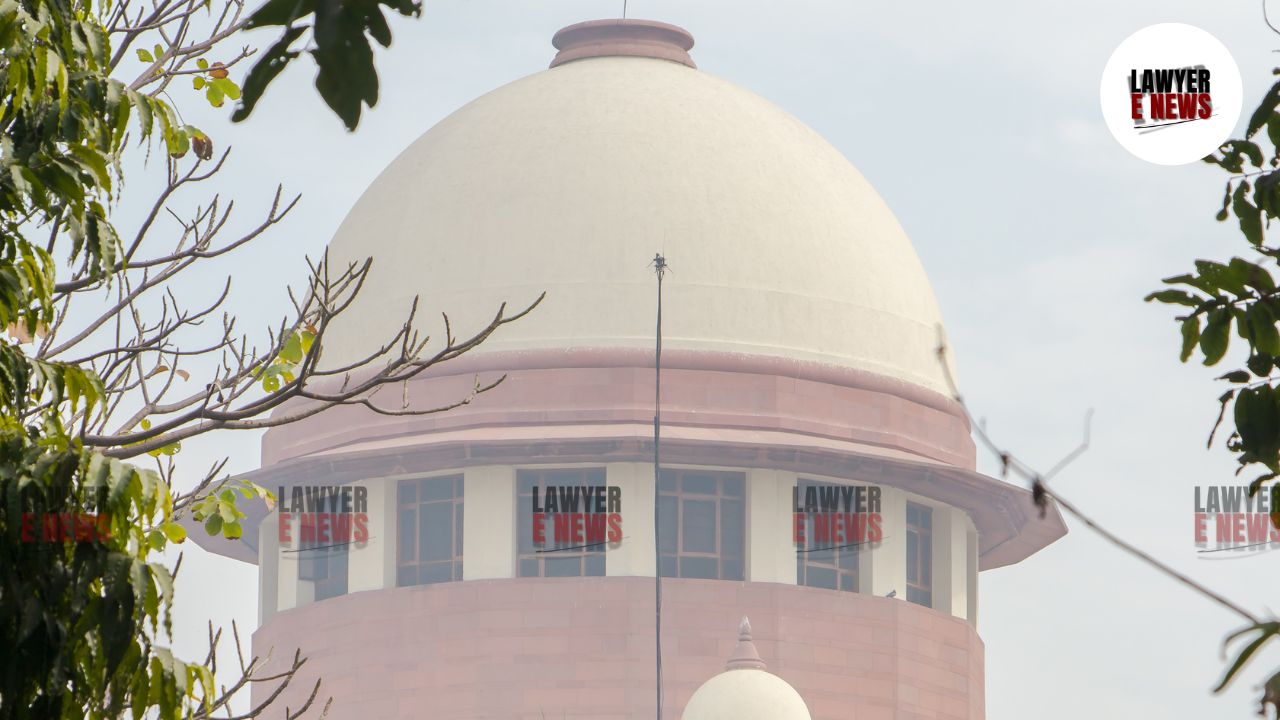-
by Admin
15 February 2026 5:01 PM



Supreme Court of India quashed the judgment of the Punjab and Haryana High Court that had overturned an enhanced compensation order under Section 28-A of the Land Acquisition Act, 1894. The apex court upheld the interpretation that applications for redetermination of compensation under Section 28-A can be filed within three months of a High Court's award enhancing compensation and not just the first award by the Reference Court.
The bench comprising Justice B.R. Gavai and Justice K.V. Viswanathan restored the order of the Land Acquisition Collector (LAC) granting enhanced compensation to appellants whose lands were acquired for the Kundli-Manesar-Palwal Expressway.
Beneficent Legislation Like Section 28-A Should Address Inequalities in Compensation Payments: Supreme Court
The appellants’ lands were acquired under a notification dated November 17, 2004, for the Kundli-Manesar-Palwal Expressway project. The Land Acquisition Collector (LAC) awarded compensation of ₹12,50,000/- per acre on March 1, 2006. Some landowners sought enhanced compensation through a reference under Section 18 of the Act, which was initially dismissed by the Additional District Judge but later allowed by the Punjab and Haryana High Court in 2016. The High Court enhanced the compensation to ₹19,91,300/- per acre.
The appellants, who had not sought a reference under Section 18, filed applications under Section 28-A to seek redetermination of compensation based on the High Court's judgment. On September 15, 2020, the LAC allowed their applications and granted the same enhanced compensation. However, the Haryana State Industrial and Infrastructure Development Corporation (HSIIDC) challenged this decision in the High Court, which overturned the LAC’s order. Aggrieved, the appellants approached the Supreme Court.
The High Court relied on Ramsingbhai Jerambhai v. State of Gujarat (2018), which restricted the applicability of Section 28-A to awards by Reference Courts under Section 18, excluding awards by appellate courts like High Courts.
The Supreme Court rejected this restrictive interpretation, noting that the earlier precedent in Union of India v. Pradeep Kumari (1995), decided by a co-equal bench, provided for a more expansive interpretation.
Court’s Observation: “The object of Section 28-A is to remove inequality in compensation payments by extending benefits to inarticulate and poor landowners unable to seek a reference under Section 18. Such a provision cannot be confined to the first award by the Reference Court and must apply to appellate court decisions as well.”
The Court emphasized that Section 28-A, as a beneficent provision, must be interpreted to advance its policy objectives, ensuring equitable compensation for landowners. A restrictive interpretation, it noted, would perpetuate inequality, contrary to legislative intent.
Court’s Remark: “Beneficent legislation like Section 28-A should be construed to extend benefits rather than curtail them. Judicial interpretation must align with the purpose of redressing inequalities for marginalized and poor landowners.”
The Supreme Court identified that Ramsingbhai had overlooked the binding precedent of Pradeep Kumari, which explicitly allowed applications under Section 28-A to be filed within three months of any court's award enhancing compensation.
Court’s Analysis: “The judgment in Ramsingbhai is per incuriam, as it failed to consider the binding precedent of Pradeep Kumari. As per the Constitution Bench in National Insurance Co. Ltd. v. Pranay Sethi (2017), an earlier decision by a co-equal bench is binding on a subsequent bench unless referred to a larger bench.”
The Court clarified that the limitation period under Section 28-A begins from the date of the award on which the redetermination is sought.
Court’s Conclusion: “The limitation period for filing an application under Section 28-A is three months from the date of the award, even if it is a High Court judgment. The appellants’ application was within this period and was therefore valid.”
Decision: The Supreme Court allowed the appeal, quashing the High Court’s judgment and restoring the LAC’s order enhancing the compensation to ₹19,91,300/- per acre.
Order: “The appeal is allowed. The judgment of the Punjab and Haryana High Court dated 25.11.2021 is quashed. The Land Acquisition Collector’s order dated 15.09.2020 granting enhanced compensation to the appellants is upheld. Pending applications are disposed of.”
This judgment reaffirms the Supreme Court’s commitment to ensuring equitable compensation for landowners under the Land Acquisition Act, 1894. By resolving conflicting judicial interpretations, it safeguards the rights of poor and marginalized landowners, providing them an opportunity to seek enhanced compensation even if they had not pursued a reference under Section 18.
Date of Decision: December 10, 2024
